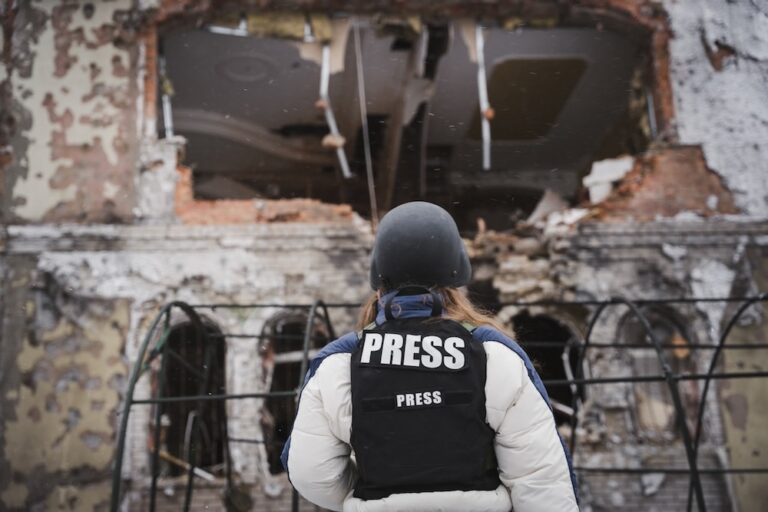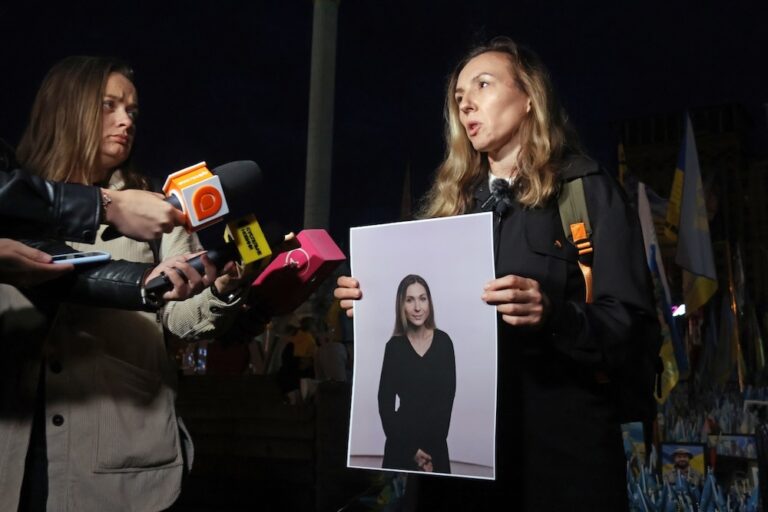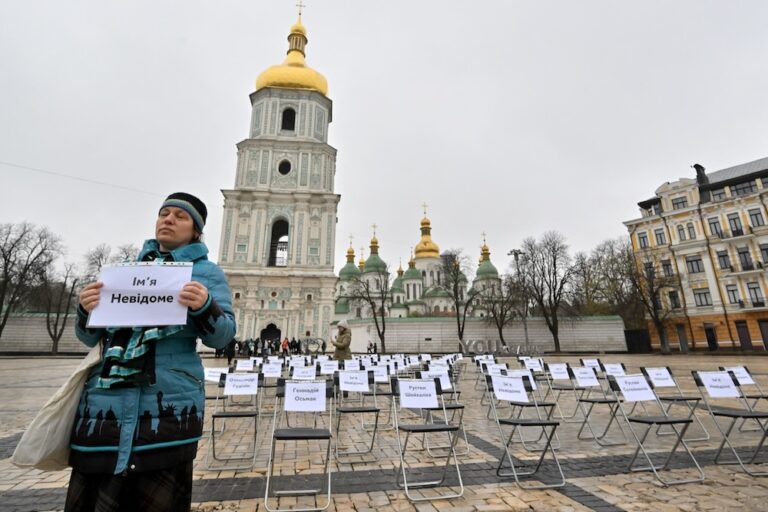(RSF/IFEX) – The following is a 5 March 1999 RSF press release: **New cases and updates to IFEX alerts of 25 February, 15 January and 6 January 1999** Press Release Ukraine RSF denounces media repression in the run up to the upcoming presidential election Kiev authorities have increased pressure against the media in the run […]
(RSF/IFEX) – The following is a 5 March 1999 RSF press release:
**New cases and updates to IFEX alerts of 25 February, 15 January and 6
January 1999**
Press Release
Ukraine
RSF denounces media repression in the run up to the upcoming
presidential election
Kiev authorities have increased pressure against the media in the run up
to the upcoming presidential elections, to be held in October 1999.
Since the beginning of the year, four journalists have been attacked and
one of their colleagues was detained. Two opposition newspapers are no
longer being published and two independent television broadcasters are
being subjected to great pressure. One political affairs programme was
suspended.
On 3 March 1999, two masked persons burst into the house of the business
manager of the private television broadcaster STB, Dmitro Dahno, and
threatened him and his eight-month pregnant wife with a knife. The two
assailants forced them to lie on the floor while they searched the
apartment. They did not take any money nor any objects of value.
On 1 March, there was a fire at the apartment of Mikola Kniajitsky, STB
president. Furthermore, he believes that he and his closest colleagues
have been followed and their telephones tapped. On 26 February, Sergeï
Korenev, STB cameraman, was attacked in the Lviv (west) railway station;
his camera and tapes were robbed. STBâs management believes that these
incidents are retaliations from financial groups linked to the
government. STB, which does not support any of the presidential
candidates, is known for its reporting on corruption and the
misappropriation of funds.
On 28 December 1998, the municipal tribunal of Petcherskiy (Kiev)
ordered the arrest of Oleg Liachko, chief editor of the weekly
“Politika”, although to date this order has not been carried out. The
journalist was found guilty of “defamation” and “abuse of power”
(articles 125 and 165 of the Penal Code), following the publication of
articles calling into question the activities of three high level police
officials. At least two other complaints have been filed against
“Politika.” This opposition weekly has not been published regularly
since May 1998. The publication’s bank accounts were frozen by the
courts, after a series of articles on persons close to president Leonid
Koutchma. In December 1998, the newspaper appealed the decision to the
Kiev Supreme Court. The Supreme Court ruled that action was illegal.
Although it was authorised to reappear after 17 February, “Politika” is
still missing from newspaper stands: none of the Kiev printing presses,
the most important of which belong to the State, are accepting to print
the newspaper (see IFEX alerts of 25 February and 6 January 1999).
On 13 January 1999, Vladimir Efremov, editor in chief for the daily
“Sobor,” was arrested and imprisoned in the Dnepropetrovsk prison
(eastern region). There, the authorities accused him of committing
irregularities in securing a loan for the newspaper in 1995. However,
the loan was entirely repaid, with interest, in 1996 and the bank is not
filing the complaint. The journalist believes that his arrest is
connected to the broadcasting of a speech by Pavel Lazarenko, main
political opposition to president Koutchma, aired on TV 11, where
Efremov is one of the senior managers. On 15 January, Efremov was
released without any explanation. He was ordered to not leave
the city (see IFEX alert of 15 January 1999).
On 26 January, Sergey Gorogeankin, director of the television network
TV-7, in Mariupol (in the east), was violently beaten with a baseball
bat in the staircase of his building. Seriously injured, Gorogeankin
required surgery. His condition remains worrisome. An inquiry into the
matter was opened on 27 January.
On 22 February, “Kievskie Vedomosti,” one of the most influential
private dailies in the country, ceased publication, citing financial
reasons. The newspaper accounts had been frozen for several months by
authorities after journalists received numerous fines. These journalists
were thrown out of their offices and have not received any pay since
November 1996.
On 28 February, a critical programme, aired by the independent
television broadcaster Vikhna, was suspended after a change in the
broadcaster’s board of management.
RSF is strongly denouncing this series of attacks on the freedom of the
press in the Ukraine. The organisation is asking Ukrainian authorities
to put an immediate end to the harassment of the media and to safeguard
the security of journalists. RSF is also urging European authorities to
use their influence to ensure the media can freely cover the
presidential elections of October 1999.


